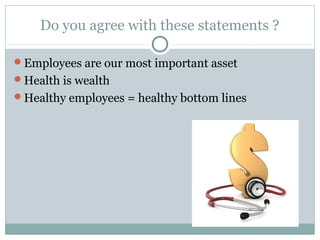
Investing in the wellness of your employees
- 1. Do you agree with these statements ? Employees are our most important asset Health is wealth Healthy employees = healthy bottom lines
- 2. Why do employee wellness programs fail ? DR MALPANI, MD FOUNDER HELP – HEALTH EDUCATION LIBRARY FOR PEOPLE WWW.HEALTHLIBRARY.COM
- 3. Why programs fail Not enough money Not enough management support Employees do not understand the importance of health and wellness Employees are not interested Often, it’s the managers themselves who create the unhealthy behaviour by stressing the employees !
- 4. Why don’t employees participate ? WITFM ? HR department is implementing the program for the company , not for me. Lack of trust ! What is being done with my personal health information ? Programs are not tailored to my needs I am required to use personal time to participate Boring !
- 5. Engaging employees is key to success Be realistic. Employees will not change lifestyles simply because you tell them to do so . It’s hard to get people to change their behaviour ! Company DNA needs to change. Design a comprehensive program to apply to all employees, from CEO to peon Provide incentives
- 6. The ideal program Offers several options since one method will not work for the entire employee population Encourages behavior change Provides quantifiable, sustainable results Contributes to a quality work environment Helps you to be an employer of choice Creates Buzz !
- 7. Best practices 1. Obtain Executive Support. 2. Fund It Appropriately. 3. Staff It. Need a team of wellness champions 4. Design an Effective Marketing and Communications Program. You need to sell it !
- 8. Lead by example ! Papa, Don’t Preach ! Will not work if executives do not participate themselves. Does your CEO take the stairs ? What do you do ?
- 9. Strategies for a successful program # 1 : Health screening # 2 : Health education. Information, & self help tools # 3 : Organized activities # 4 : Individual follow up & treatment # 5 : Incentives and rewards # 6 : Supportive workplace environment
- 10. Blended model – different strokes for different folks ! 1. Online 2. Real world 3. Coaching
- 11. Online. Digital backbone Available 24/7 Inexpensive.
- 12. Real world Talks Health fairs. Gym memberships. Health Risk Assessments Wellness library in the canteen
- 13. Coaching Direct support from a health coach. The employee builds a relationship with the coach who acts as an advocate. Online coaching is cost effective !
- 14. Proving ROI 1. Programs should be customized. One size does not fit all. 2. Phase in the programs according to your budget. 3. Something (done well) is better than nothing. 4. Do not be afraid of measurement. Collect data ! VOI ( value on investment) vs ROI ( return on investment) It takes at least 18 months from the launch of a Company Wellness program to see any impact.
- 15. Measuring ROI Participation: The easiest to measure. Satisfaction: Another easily measured variable. Behavior changes: Better lifestyle choices. Biometrics: Blood pressure, BMI, body weight and cholesterol are great targets Productivity: Absenteeism measures Medical claims: 25 to 40 percent of all medical insurance claims are avoidable through prevention, early detection and the reduction of modifiable health risk factors.
- 16. It’s all connected. Wellness is no longer a “nice to have”; it’s a business strategy. Healthy employees have higher levels of engagement and productivity. Healthy companies outperform their competition. Low employee engagement and high work-related stress leads to unhealthy employees. Unhealthy employees lead to higher costs and lower productivity.
- 17. Chief Wellness Officer People must live healthier lifestyles, but they need help. They spend most of their time at work, so HR has a great opportunity to help them. What’s more “human” than helping people get healthy? Wellness is a valuable growth strategy.
- 18. Why do so many employee wellness programs fail ? Typical employee wellness programs are too focused on health and not enough on happiness. Need to engage employees first, and then make them healthy. A wellness program that isn’t being used has zero chance of success. The Carrot Is Tastier Than The Stick Small changes in behavior lead to huge results.
- 19. Doctors are part of the problem The Indian healthcare system has become sick. Doctors are illness experts – and not healthcare experts. Your employees are the true experts on their health. Give them the tools – and learn from them ! Make it fun !
- 20. The Buck Stops Here ! Take ownership of the problem Positive Deviance Challenging task = Great opportunity !
